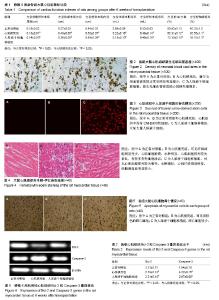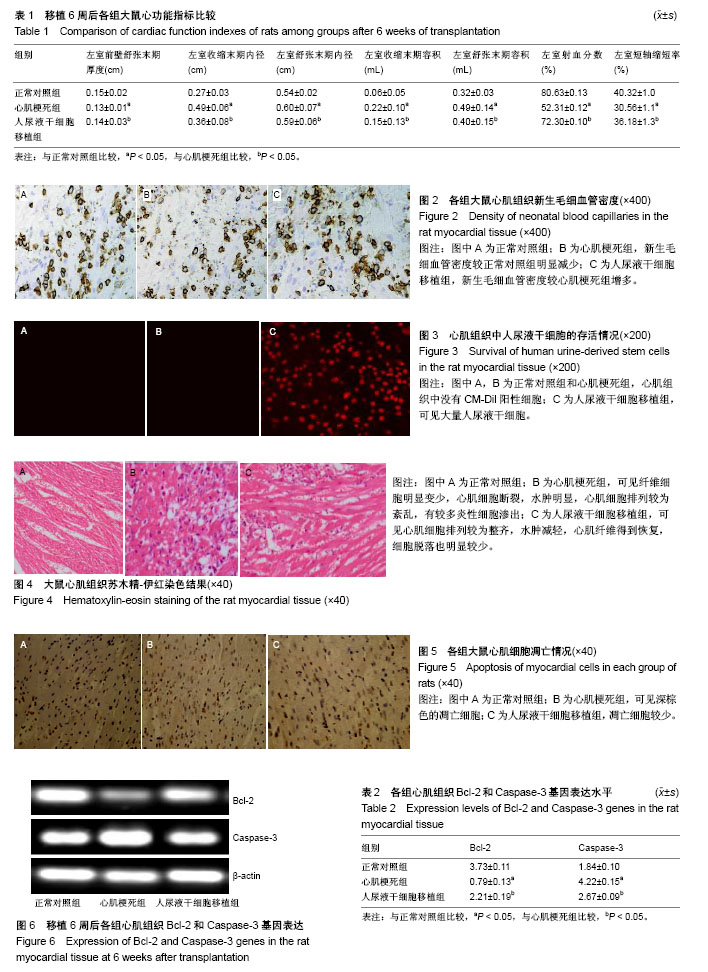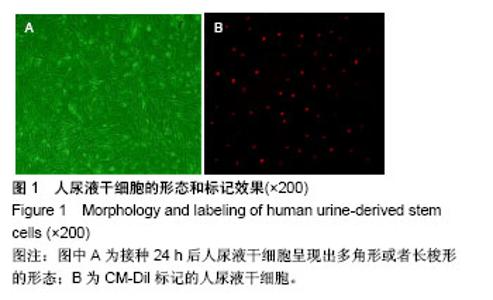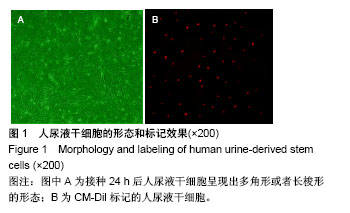Chinese Journal of Tissue Engineering Research ›› 2018, Vol. 22 ›› Issue (33): 5303-5308.doi: 10.3969/j.issn.2095-4344.0664
Previous Articles Next Articles
Human urine-derived stem cells transplantation for treatment of myocardial infarction in rats
Sun He-yuan
- Department of Intensive Medicine, Tianjin Fourth Central Hospital, Tianjin 300140, China
-
Revised:2018-07-16Online:2018-11-28Published:2018-11-28 -
About author:Sun He-yuan, Master, Attending physician, Department of Intensive Medicine, Tianjin Fourth Central Hospital, Tianjin 300140, China
CLC Number:
Cite this article
Sun He-yuan. Human urine-derived stem cells transplantation for treatment of myocardial infarction in rats[J]. Chinese Journal of Tissue Engineering Research, 2018, 22(33): 5303-5308.
share this article

2.2 各组大鼠心功能检测结果 细胞移植后6周,与心肌梗死组比较,人尿液干细胞移植组大鼠心功能明显改善(P < 0.05),见表1。 2.3 各组大鼠心肌组织新生毛细血管密度 正常对照组、心肌梗死组、人尿液干细胞移植组新生毛细血管密度分别为(96.19±14.03),(45.93±8.16),(83.88±15.63)个/高倍视野。与心肌梗死组比较,人尿液干细胞移植组新生毛细血管密度增多(P < 0.05),见图2。 2.4 各组大鼠心肌组织中人尿液干细胞的存活情况 移植后6周,荧光显微镜下观察可见正常对照组和心肌梗死组大鼠心肌组织中没有CM-Dil阳性细胞,人尿液干细胞移植组大鼠心肌组织出现大量的CM-Dil阳性细胞(63.52±5.32)个/高倍视野,见图3。 2.5 各组大鼠心肌组织苏木精-伊红染色结果 见图4。与正常对照组比较,心肌梗死组心肌组织具有明显的损伤,可见较多的脱落细胞。与心肌梗死组相比,人尿液干细胞移植组心肌组织损伤明显减轻,细胞脱落也明显较少。 2.6 各组大鼠心肌细胞凋亡情况 见图5。与正常对照组[(3.0±0.5)%]相比,心肌梗死组心肌组织细胞凋亡率显著升高[(37.2±6.3)%];人尿液干细胞移植组细胞凋亡率[(10.7±2.6)%]显著低于心肌梗死组。 2.7 各组心肌组织Bcl-2和Caspase-3基因表达水平 见表2和图6。与心肌梗死组相比,人尿液干细胞移植组心肌组织中Bcl-2基因表达水平显著增高(P < 0.05),Caspase-3基因表达水平显著降低(P < 0.05)。"

| [1] 赵艳.急性心肌梗死治疗进展[J].数理医药学杂志, 2016,29(4): 563-564.[2] 杜月,崔映波,余显伦,等.急性心肌梗死的药物治疗现状与进展[J].医学信息,2015,28(50):387-388.[3] 冯敏.临床治疗心肌梗死的研究进展[[J].实用心脑血管病杂志, 2014,22(6):3-4.[4] 李波,刘杨,杨鹏.间充质干细胞应用进展[J].临床军医杂志, 2016, 44(2):205-208.[5] 许锴,陈霞,高绍荣.我国诱导多能干细胞研究进展[J].生物技术通报,2015,31(4):72-81.[6] Caulfield T, Kamenova K, Ogbogu U, et al. Research ethics and stem cells: Is it time to re-think current approaches to oversight. EMBO Rep. 2015;16(1):2-6. [7] Holm S.Biobanking human embryonic stem cell lines: policy, ethics and efficiency.Monash Bioeth Rev. 2015;33(4): 265-276. [8] 周明.人尿液源性干细胞的分离培养研究[C].2016(第二届)毒性测试替代方法与转化毒理学(国际)学术研讨会暨有害结局路径(AOP)与风险评估培训会议论文集,2016:72-73.[9] Xue Y, Cai X, Wang L, et al. Generating a non-integrating human induced pluripotent stem cell bank from urine-derived cells.PLoS One. 2013;8(8):e70573. [10] Zhang D, Wei G, Li P, et al. Urine-derived stem cells: A novel and versatile progenitor source for cell-based therapy and regenerative medicine.Genes Dis. 2014;1(1):8-17. [11] Gao P, Han P, Jiang D, et al. Effects of the donor age on proliferation, senescence and osteogenic capacity of human urine-derived stem cells.Cytotechnology. 2017;69(5):751-763. [12] Jiang ZZ, Liu YM, Niu X, et al. Exosomes secreted by human urine-derived stem cells could prevent kidney complications from type I diabetes in rats.Stem Cell Res Ther. 2016;7:24. [13] Chun SY,Park GB,Kwon TG, et al.Analysis of stability of human urine derived stem cells during serial subcultures. Tissue Engineering & Regenerative Medicine. 2015;12(2): 122-131. [14] Tran C,Tangada A,Yi H, et al.PD35-05 human urine-derived stem cells or their secretome alone facilitate functional recovery in a rat model of stress urinary incontinence.Journal of Urology.2016;195(4):e845. [15] 邹松平,王宇,李春雨,等.骨髓间充质干细胞旁分泌对急性心肌梗死心肌的保护作用[J].中国组织工程研究, 2014,18(23): 3653-3659.[16] 汪兆艳,郭建巍,杨印祥,等.自体与异体脂肪间充质干细胞移植治疗大鼠急性心肌梗死的比较研究[J].解放军医学杂志, 2017, 42(9):788-792.[17] 郑楠,张宁坤,高连如.成体心肌干细胞的研究进展[J].解放军医学杂志,2013,38(4):334-337.[18] 赫为,朱琼瑶.人尿液干细胞定向移植治疗大鼠颅脑损伤[J].临床和实验医学杂志,2017,16(13):1258-1261.[19] Elkayam U, Jalnapurkar S, Barakkat MN, et al. Pregnancy-associated acute myocardial infarction: a review of contemporary experience in 150 cases between 2006 and 2011.Circulation. 2014;129(16):1695-1702. [20] Ban K, Park HJ, Kim S, et al. Cell therapy with embryonic stem cell-derived cardiomyocytes encapsulated in injectable nanomatrix gel enhances cell engraftment and promotes cardiac repair.ACS Nano. 2014;8(10):10815-10825. [21] Kochegarov A, Moses-Arms A, Lemanski LF.A fetal human heart cardiac-inducing RNA (CIR) promotes the differentiation of stem cells into cardiomyocytes.In Vitro Cell Dev Biol Anim. 2015;51(7):739-748. [22] Abd El Aziz MT, Abd El Nabi EA, Abd El Hamid M, et al. Endothelial progenitor cells regenerate infracted myocardium with neovascularisation development.J Adv Res. 2015;6(2): 133-144. [23] Fatkhudinov T, Bolshakova G, Arutyunyan I, et al. Bone marrow-derived multipotent stromal cells promote myocardial fibrosis and reverse remodeling of the left ventricle.Stem Cells Int. 2015;2015:746873. [24] Zhao L, Yang G, Zhao X.Rho-associated protein kinases play an important role in the differentiation of rat adipose-derived stromal cells into cardiomyocytes in vitro.PLoS One. 2014; 9(12):e115191. [25] 梁宵,李彤,杨树森.干细胞治疗心肌梗死研究进展[J].临床和实验医学杂志,2015,14(18):1574-1577.[26] 刘金峰,凌斌.骨髓间充质干细胞对心肌梗死治疗的研究进展[J].中国医学科学院学报,2015,37(1):108-112.[27] 姜大庆,谷天祥,徐兆发,等.心肌球源性心肌干细胞联合心室肌细胞外基质治疗大鼠急性心肌梗死效果[J].南方医科大学学报, 2016,36(10):1316-1321.[28] Zhu Q, Li Q, Niu X, et al. Extracellular Vesicles Secreted by Human Urine-Derived Stem Cells Promote Ischemia Repair in a Mouse Model of Hind-Limb Ischemia. Cell Physiol Biochem. 2018;47(3):1181-1192.[29] Chen L, Li L, Xing F, et al. Human Urine-Derived Stem Cells: Potential for Cell-Based Therapy of Cartilage Defects. Stem Cells Int. 2018;2018:4686259. [30] Ji X, Wang M, Chen F, et al. Urine-Derived Stem Cells: The Present and the Future. Stem Cells Int. 2017;2017:4378947. [31] Tayhan SE, Kele? GT, Topçu ?, et al. Isolation and in vitro cultivation of human urine-derived cells: an alternative stem cell source. Turk J Urol. 2017;43(3):345-349.[32] Tian SF, Jiang ZZ, Liu YM, et al. Human urine-derived stem cells contribute to the repair of ischemic acute kidney injury in rats. Mol Med Rep. 2017;16(4):5541-5548.[33] Liu Y, Ma W, Liu B, et al. Urethral reconstruction with autologous urine-derived stem cells seeded in three-dimensional porous small intestinal submucosa in a rabbit model. Stem Cell Res Ther. 2017;8(1):63.[34] Yang Q, Chen X, Zheng T, et al. Transplantation of Human Urine-Derived Stem Cells Transfected with Pigment Epithelium-Derived Factor to Protect Erectile Function in a Rat Model of Cavernous Nerve Injury. Cell Transplant. 2016; 25(11):1987-2001. [35] Gao P, Jiang D, Li Z. The application progress of human urine derived stem cells in bone tissue engineering. Zhonghua Wai Ke Za Zhi. 2016;54(4):317-320. [36] Dong X, Zhang T, Liu Q, et al. Beneficial effects of urine-derived stem cells on fibrosis and apoptosis of myocardial, glomerular and bladder cells. Mol Cell Endocrinol. 2016;427:21-32.[37] Sun H, Zhang F, Wang Y, et al. Generation of induced pluripotent stem cell line (ZZUi011-A) from urine sample of a normal human.Stem Cell Res. 2018;29:28-31. [38] Hirsch T, Marzo I, Kroemer G.Role of the mitochondrial permeability transition pore in apoptosis.Biosci Rep. 1997;17(1):67-76. [39] 郭洁,张宝辉.丹参酮ⅡA对急性心肌梗死大鼠的心肌凋亡及Bax与Caspase-3表达的影响[J].解剖科学进展, 2017,23(3): 228-230.[40] 袁芳.山楂叶总黄酮对心肌缺血再灌注损伤大鼠心肌细胞凋亡及bcl-2、Bax、caspase-3蛋白表达影响[J].辽宁中医药大学学报,2016,18(8):42-45.[41] Adams JM, Cory S.The Bcl-2 protein family: arbiters of cell survival.Science. 1998;281(5381):1322-1326. [42] 陈辉,黄政德.Bcl-2、Bax与心肌缺血再灌注损伤细胞凋亡[J].辽宁中医药大学学报,2014,16(9):116-120.[43] 王婷,张智博.Bcl-2蛋白在调控细胞凋亡与自噬中的作用[J].心脑血管病防治,2014,14(4):315-318. |
| [1] | Zhang Tongtong, Wang Zhonghua, Wen Jie, Song Yuxin, Liu Lin. Application of three-dimensional printing model in surgical resection and reconstruction of cervical tumor [J]. Chinese Journal of Tissue Engineering Research, 2021, 25(9): 1335-1339. |
| [2] | Zhang Yu, Tian Shaoqi, Zeng Guobo, Hu Chuan. Risk factors for myocardial infarction following primary total joint arthroplasty [J]. Chinese Journal of Tissue Engineering Research, 2021, 25(9): 1340-1345. |
| [3] | Zeng Yanhua, Hao Yanlei. In vitro culture and purification of Schwann cells: a systematic review [J]. Chinese Journal of Tissue Engineering Research, 2021, 25(7): 1135-1141. |
| [4] | Nie Huijuan, Huang Zhichun. The role of Hedgehog signaling pathway in transforming growth factor beta1-induced myofibroblast transdifferentiation [J]. Chinese Journal of Tissue Engineering Research, 2021, 25(5): 754-760. |
| [5] | Xu Dongzi, Zhang Ting, Ouyang Zhaolian. The global competitive situation of cardiac tissue engineering based on patent analysis [J]. Chinese Journal of Tissue Engineering Research, 2021, 25(5): 807-812. |
| [6] | Wu Zijian, Hu Zhaoduan, Xie Youqiong, Wang Feng, Li Jia, Li Bocun, Cai Guowei, Peng Rui. Three-dimensional printing technology and bone tissue engineering research: literature metrology and visual analysis of research hotspots [J]. Chinese Journal of Tissue Engineering Research, 2021, 25(4): 564-569. |
| [7] | Chang Wenliao, Zhao Jie, Sun Xiaoliang, Wang Kun, Wu Guofeng, Zhou Jian, Li Shuxiang, Sun Han. Material selection, theoretical design and biomimetic function of artificial periosteum [J]. Chinese Journal of Tissue Engineering Research, 2021, 25(4): 600-606. |
| [8] | Liu Fei, Cui Yutao, Liu He. Advantages and problems of local antibiotic delivery system in the treatment of osteomyelitis [J]. Chinese Journal of Tissue Engineering Research, 2021, 25(4): 614-620. |
| [9] | Li Xiaozhuang, Duan Hao, Wang Weizhou, Tang Zhihong, Wang Yanghao, He Fei. Application of bone tissue engineering materials in the treatment of bone defect diseases in vivo [J]. Chinese Journal of Tissue Engineering Research, 2021, 25(4): 626-631. |
| [10] | Zhang Zhenkun, Li Zhe, Li Ya, Wang Yingying, Wang Yaping, Zhou Xinkui, Ma Shanshan, Guan Fangxia. Application of alginate based hydrogels/dressings in wound healing: sustained, dynamic and sequential release [J]. Chinese Journal of Tissue Engineering Research, 2021, 25(4): 638-643. |
| [11] | Chen Jiana, Qiu Yanling, Nie Minhai, Liu Xuqian. Tissue engineering scaffolds in repairing oral and maxillofacial soft tissue defects [J]. Chinese Journal of Tissue Engineering Research, 2021, 25(4): 644-650. |
| [12] | Xing Hao, Zhang Yonghong, Wang Dong. Advantages and disadvantages of repairing large-segment bone defect [J]. Chinese Journal of Tissue Engineering Research, 2021, 25(3): 426-430. |
| [13] | Chen Siqi, Xian Debin, Xu Rongsheng, Qin Zhongjie, Zhang Lei, Xia Delin. Effects of bone marrow mesenchymal stem cells and human umbilical vein endothelial cells combined with hydroxyapatite-tricalcium phosphate scaffolds on early angiogenesis in skull defect repair in rats [J]. Chinese Journal of Tissue Engineering Research, 2021, 25(22): 3458-3465. |
| [14] | Wang Hao, Chen Mingxue, Li Junkang, Luo Xujiang, Peng Liqing, Li Huo, Huang Bo, Tian Guangzhao, Liu Shuyun, Sui Xiang, Huang Jingxiang, Guo Quanyi, Lu Xiaobo. Decellularized porcine skin matrix for tissue-engineered meniscus scaffold [J]. Chinese Journal of Tissue Engineering Research, 2021, 25(22): 3473-3478. |
| [15] | Mo Jianling, He Shaoru, Feng Bowen, Jian Minqiao, Zhang Xiaohui, Liu Caisheng, Liang Yijing, Liu Yumei, Chen Liang, Zhou Haiyu, Liu Yanhui. Forming prevascularized cell sheets and the expression of angiogenesis-related factors [J]. Chinese Journal of Tissue Engineering Research, 2021, 25(22): 3479-3486. |
| Viewed | ||||||
|
Full text |
|
|||||
|
Abstract |
|
|||||

